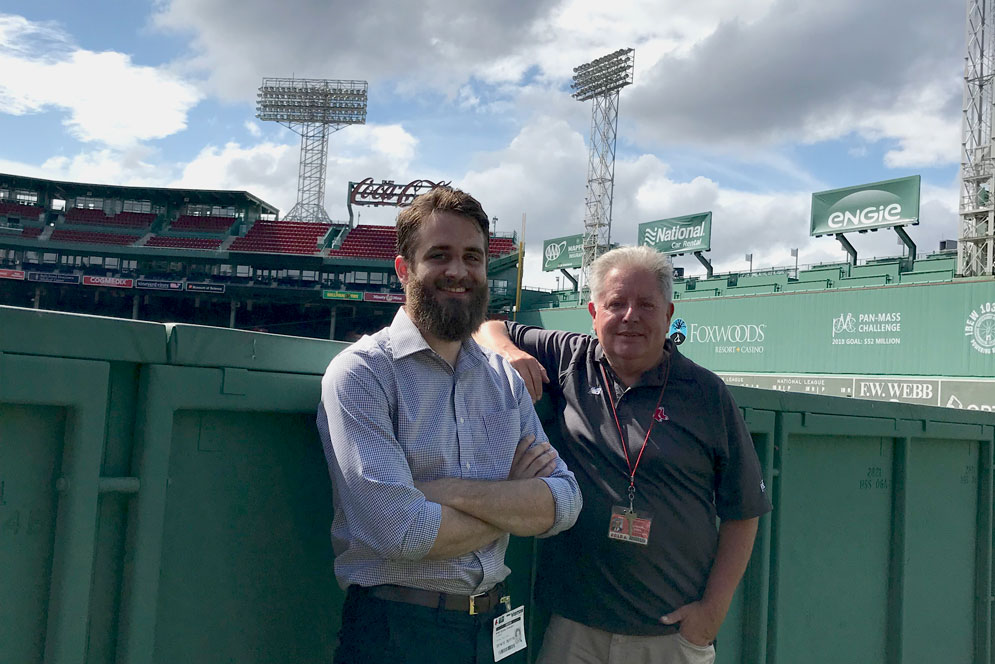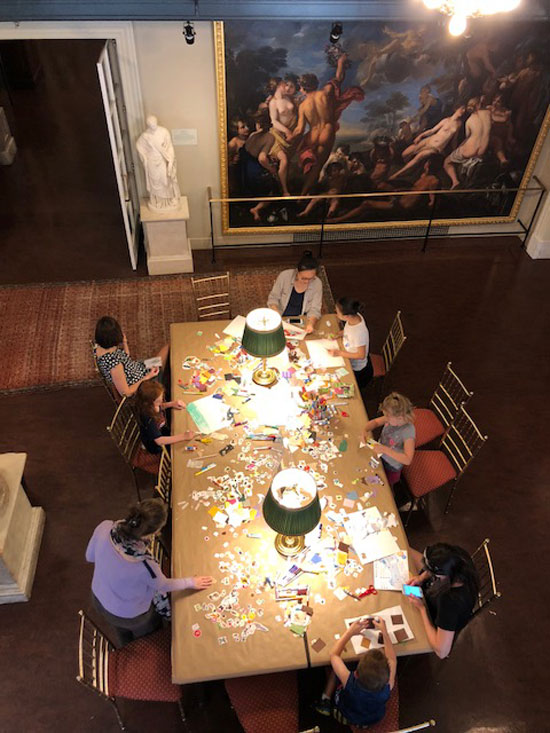A PhD in the Humanities? It’s Not Just for Teaching Anymore
New career paths open up as faculty spots become harder to land

Chris Stokum (GRS’21) (left) and Red Sox team historian Gordon Edes at Fenway Park. Photo courtesy of Boston Red Sox
TAKEAWAYS:
- Internships give BU PhD candidates a new perspective
- The same five sites will host interns this year
- Deadline to apply for summer 2019 is February 15
Growing up in western Pennsylvania, Chris Stokum wasn’t a big baseball fan, yet the PhD candidate in American Studies spent most of last summer working as an intern for the Boston Red Sox. While Fenway Park isn’t far from campus, it’s a long way off the traditional academic career path—and a sign of just how much the job market for humanities graduates is changing.
Stokum helped the Sox historian plan upcoming exhibitions and coproduced a podcast series about the annual Harvard-Yale football game, which was played at Fenway Park for the first time last fall.
“Each of these projects were exercises in trying to reconcile some of the research and analytic skills that I’ve acquired as a graduate student with these various media and communicating with wider audiences,” says Stokum (GRS’21), a student in the College of Arts & Sciences American & New England Studies Program. He also managed to attend a Sox game or two.
His summer at Fenway was courtesy of BU’s first Summer Internships for Humanities PhD Students, initiated by the Associate Provost for Graduate Affairs office and the BU Center for the Humanities. The other four recipients took their talents to Boston City Hall, the Boston Public Library, the Boston Athenæum, and the Isabella Stewart Gardner Museum. The internships are being offered again for summer 2019, and the deadline to apply online for the five internships is February 15.
Stokum’s mentor at Fenway, Red Sox historian and former longtime Boston Globe baseball writer Gordon Edes, assigned him to write a piece on the famous Harvard-Yale football game of 1968, which Harvard “won” 29-29 in a wildly dramatic ending.

“It was for the program that we sell at the ballpark, so it’s not your classic academic audience,” Edes says. “In Chris’ first submission, he was taking some deep dives into the sociological implications of that game, and I said, ‘You might want to tell them a little bit about how they scored 16 points in the last 42 seconds.’ And he did write a terrific piece.”
A PhD in the humanities traditionally leads to a faculty position, possibly a tenure-track one, but it’s common knowledge that nowadays there are more diplomas being awarded than job openings. That’s forcing doctoral students to broaden their focus as they envision the future. “Grad students scramble as humanities jobs in academia dwindle,” the Yale Daily News reported last year. “The Shrinking Humanities Job Market” Inside Higher Ed called it in 2017.
BU offers doctorates in humanities areas such as literature, history, and philosophy, and the research and other skills acquired on the path to a degree can be valuable in many settings besides academia, says Daniel Kleinman, associate provost for graduate affairs.
“It turns out that PhDs can do a lot of things, and we in higher education need to show that’s true, to students, employers, and the public,” Kleinman says. “You could imagine students coming to get a PhD in history because they want to be public historians and work at history museums, or they want to serve as the historian at a government agency, or frankly, that they want to go work at Google.”
He created the BU internship program with Susan Mizruchi, a CAS professor of English and William Arrowsmith Professor in the Humanities, and Center for the Humanities director. It includes a stipend that allows them to take full advantage of the opportunity without waiting tables to pay their rent.
“It gives our PhD students an opportunity to take their skills, their knowledge, their various forms of expertise out into the world,” Mizruchi says. “I think what the students find in these internships is how much they have to offer, how their knowledge translates into really rich abilities that really important institutions value.”
Rachel Wilson (GRS’24), a PhD candidate in history, interned at the Isabella Stewart Gardner Museum, where she researched connections between the Stewart and Gardner families and slavery.

At a mid-January panel discussion at the Rajen Kilachand Center for Integrated Life Sciences & Engineering, some of the students and their mentors explained their work to encourage students to apply for the internship. “What I discovered at the end of my research was a relationship between Isabella Stewart Gardner’s maternal grandmother and a property where she had recorded owning slaves,” Wilson said at the panel. “I was able to help the Gardner Museum provide a more accurate picture of its institutional history, and from there, it led to series of wall posts and even helping them craft the game plan for a diversity task force.”
Emma Newcombe (GRS’18), also an American & New England Studies Program student, spent the summer at the Boston Athenæum, where her main project was putting together a workshop for schoolteachers on using primary sources, which will be held this coming summer.
Newcombe has since graduated and is currently a visiting assistant professor of American studies at Skidmore College. Ewa Matyczyk (GRS’20), a history of art and architecture student, worked in Boston City Hall, researching controversies over public art for the Boston Art Commission in the Mayor’s Office of Arts and Culture. Kelsey Gustin (GRS’20), also working on a history of art and architecture degree, worked at the Boston Public Library, blogging to promote a long-term project to crowd-source transcriptions of the library’s collection of 12,000 antislavery manuscripts and transcribing 75 herself.
At the January panel discussion, Edes from the Red Sox noted one unexpected consequence of Stokum’s internship.
“I suspect you all know how superstitious sports teams are,” he said. “I apologize in advance, Chris, but we cannot let you go, since we won a World Series this year with you on board.”
Joking aside, when humanities PhD students find their paths taking surprising turns—like into the hallways of hallowed ballparks—it shows just how far their career picture has changed.

Comments & Discussion
Boston University moderates comments to facilitate an informed, substantive, civil conversation. Abusive, profane, self-promotional, misleading, incoherent or off-topic comments will be rejected. Moderators are staffed during regular business hours (EST) and can only accept comments written in English. Statistics or facts must include a citation or a link to the citation.